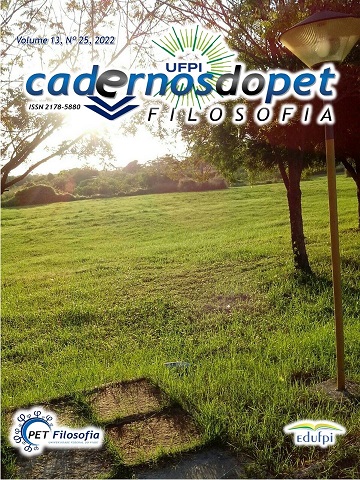Philosophy, literature and education: a study of the work The ocean at the end of the way by Neil Gaiman from Richard Rorty’s notion of narrative
DOI:
https://doi.org/10.26694/cadpetfilo.v13i25.2979Keywords:
EDUCATION. PHILOSOPHY. LITERATURE. LANGUAGE. NARRATIVE.Abstract
This work is bibliographic research and has as general objective to identify in the works of Richard Rorty theoretical elements that can guide investigations about the relationship between philosophy, literature and education. And as specific objectives of the way, explicit of Narrative in the definition of Rorty's creation and investigator of the main narrative and thematic characters concerning the main characters of the work. The ocean at the end of Neil Gaiman. However, from Rorty's perspective, it is possible to consider that education has an important role in relation to society. Since, as worldviews essentially proposed by literature, it instigates creativity, autonomy and approximation to reality, promoting a direct relationship between the character and the reader. What to do in one of human solidarity, and mostly. Therefore, the unique neopragmatist narrative philosopher introduces as the main tool for a moral and political change since, this is highly intertwined with imagination, such creation goes against tradition, which considers reason as the source of transformation. In addition, Richard Rorty (199) understands factors such as real space, knowledge, language and morals, based on the notion of time and search, because, for the philosopher, nothing escapes time and chance.
References
BERALER, Tracy L.; LURIA, Rachel; YUEN, Wayne. Neil Gaiman and philosophy. Ed. Open Court, Chicago, 2012.
GAIMAN, Neil. O oceano no fim do caminho. Ed. Intríseca Ltda, Rio de Janeiro, 2013.
HEGEL, Friedrich. Fenomenologia do espírito. Ed. Vozes, Petrópolis, 1992.
RORTY, Richard. Ironia, contingência e solidariedade. Lisboa: Editorial Presença, 1994.
SILVA, Heraldo Aparecido. A Filosofia da educação de Richard Rorty: epstemologia, conversação, redescrições, narrativas e as funções da educação. Ed. Educação e Filosofia, . Uberlândia- MG. Julho/dezembro,2012.
SILVA, Heraldo Aparecido. A caixa de ferramentas conceituais de Richard Rorty: uso da técnica AD HOC. Ed. Revista eletrônica de filosofia, São Paulo- SP. Julho-Dezembro, 2019.
SILVA, Heraldo Aparecido. Metáforas, redescrições e o processo contínuo de construção de novas subjetividades no neopragmatismo de Rorty. Ed. Pensando- Revista de Filosofia, Universidade Federal do Piauí- UFPI, 2019.
SILVA, Heraldo Aparecido. Cultura pop: quadrinhos, cinema, seriados, animações, internet e afins. Ed. Marca da Fantasia, Paraíba, 2021.











